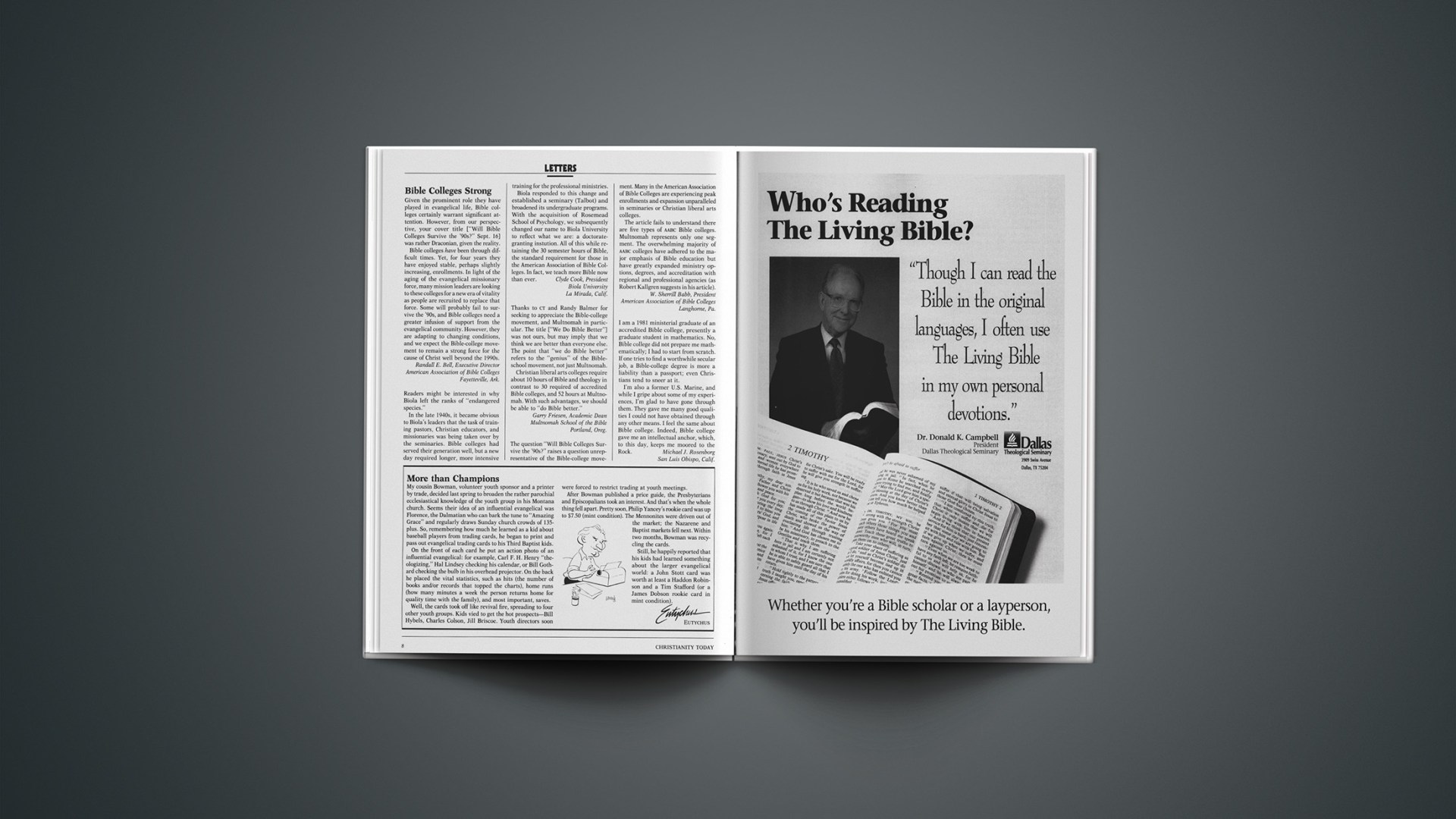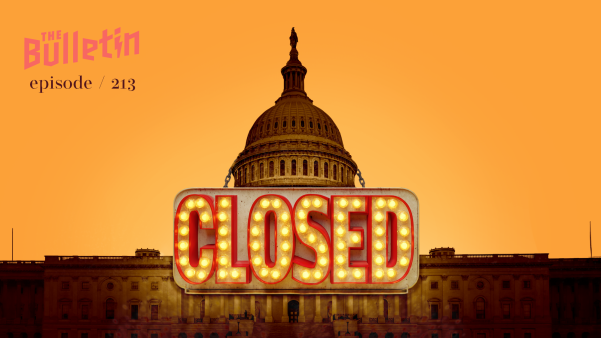Bible Colleges Strong
Given the prominent role they have played in evangelical life, Bible colleges certainly warrant significant attention. However, from our perspective, your cover title [“Will Bible Colleges Survive the ’90s?” Sept. 16] was rather Draconian, given the reality.
Bible colleges have been through difficult times. Yet, for four years they have enjoyed stable, perhaps slightly increasing, enrollments. In light of the aging of the evangelical missionary force, many mission leaders are looking to these colleges for a new era of vitality as people are recruited to replace that force. Some will probably fail to survive the ’90s, and Bible colleges need a greater infusion of support from the evangelical community. However, they are adapting to changing conditions, and we expect the Bible-college movement to remain a strong force for the cause of Christ well beyond the 1990s.
Randall E. Bell, Executive Director
American Association of Bible Colleges
Fayetteville, Ark.
Readers might be interested in why Biola left the ranks of “endangered species.”
In the late 1940s, it became obvious to Biola’s leaders that the task of training pastors, Christian educators, and missionaries was being taken over by the seminaries. Bible colleges had served their generation well, but a new day required longer, more intensive training for the professional ministries.
Biola responded to this change and established a seminary (Talbot) and broadened its undergraduate programs. With the acquisition of Rosemead School of Psychology, we subsequently changed our name to Biola University to reflect what we are: a doctorate-granting instution. All of this while retaining the 30 semester hours of Bible, the standard requirement for those in the American Association of Bible Colleges. In fact, we teach more Bible now than ever.
Clyde Cook, President
Biola University
La Mirada, Calif.
Thanks to CT and Randy Balmer for seeking to appreciate the Bible-college movement, and Multnomah in particular. The title [“We Do Bible Better”] was not ours, but may imply that we think we are better than everyone else. The point that “we do Bible better” refers to the “genius” of the Bible-school movement, not just Multnomah.
Christian liberal arts colleges require about 10 hours of Bible and theology in contrast to 30 required of accredited Bible colleges, and 52 hours at Multnomah. With such advantages, we should be able to “do Bible better.”
Garry Friesen, Academic Dean
Multnomah School of the Bible
Portland, Oreg.
The question “Will Bible Colleges Survive the ’90s?” raises a question unrepresentative of the Bible-college movement. Many in the American Association of Bible Colleges are experiencing peak enrollments and expansion unparalleled in seminaries or Christian liberal arts colleges.
The article fails to understand there are five types of AABC Bible colleges. Multnomah represents only one segment. The overwhelming majority of AABC colleges have adhered to the major emphasis of Bible education but have greatly expanded ministry options, degrees, and accreditation with regional and professional agencies (as Robert Kallgren suggests in his article).
W. Sherrill Babb, President
American Association of Bible Colleges
Langhorne, Pa.
I am a 1981 ministerial graduate of an accredited Bible college, presently a graduate student in mathematics. No, Bible college did not prepare me mathematically; I had to start from scratch. If one tries to find a worthwhile secular job, a Bible-college degree is more a liability than a passport; even Christians tend to sneer at it.
I’m also a former U.S. Marine, and while I gripe about some of my experiences, I’m glad to have gone through them. They gave me many good qualities I could not have obtained through any other means. I feel the same about Bible college. Indeed, Bible college gave me an intellectual anchor, which, to this day, keeps me moored to the Rock.
Michael J. Rosenborg
San Luis Obispo, Calif.
Prior to entering Multnomah I attended two other colleges. I did poorly in most of the academic courses at both schools. I attended Multnomah because it was Bible I wanted, and it was Bible I got.
My wife and I have served in ministry for over 25 years. We have ministered in several communities with and to people with years of college and degrees behind their names. We have never felt hindered because we lacked degrees. My concern is that Bible-school students are not being challenged to step out into ministry with their Bible-school diploma in hand. I felt in the 1960s that many Bible-school students were being challenged to move on in higher education rather than into ministry. I don’t believe in 30 years the situation has changed.
Dwayne T. Hester
Foresthill, Calif.
I would have wished for a balanced presentation showing the diversity and vitality of scores of Bible colleges that continue to grow, improve, and flourish in the midst of today’s ministry environment. Bible colleges are different in some ways from Bible institutes, and there are also differences between Bible colleges. Common threads that hold them together are the teaching of the Bible, not about the Bible, as is done at Christian liberal arts colleges; the expectancy and integration of ministry for each student; and the professional nature of the institution.
Many of us are growing, have our budgets in the black, have attractive and expanding campuses, and do not look like “an endangered species.”
Gilbert A. Peterson, President
Lancaster Bible College
Lancaster, Pa.
I am surprised you omitted a very important recent development in Bible colleges. Extension classes, particularly in metro areas across the U.S., are popping up. Training students in their environment makes sense. By opening and operating extensions and becoming more innovative, Bible colleges will thrive rather than at best survive as an institution that has not remained contemporary.
Pastor Larry Mancini
Bay Shore Church of the Nazarene
Bay Shore, N.Y.
Waging peace in Israel
I am puzzled by the tenor of the article “No Shalom in a Land Called Holy” [Sept. 16]. I was in that “assortment” of religious journalists. Sniping at the spiritual beliefs of fellow travelers is irrelevant to the story. The writer has not given much-needed clarity to an extremely complex situation. He did not report the numerous positives of Israel so readily apparent even to a casual observer. While the story is compelling and well written, it certainly is not fair. On Independence Day eve, we were led by our guide into a crowd of thousands, shoulder to shoulder, for two hours, in downtown Jerusalem, without a single incident.
Peace is fragile—and it must be waged, like war. I have observed among Israeli citizens and government leaders more than a passing interest in peace.
William Fletcher Allen
Brentwood, Tenn.
It is interesting to see the attitude of the “do it yourself” generation as Christians, Jews, and Muslims come together, each with their own agenda in that perpetually strife-torn region of Israel. Thanks for giving Timothy Jones the opportunity to present the prejudices and biases of each group and stir our consciences about human value. Were it not that I firmly believe God is in the midst of it, I would be discouraged by the narrow unforgiveness on all sides.
Ms. Kathi Henry
Sierra Madre, Calif.
What are Christians, including writer Jones and his editor, doing for peace and for the Palestinians? Why was Jones so timid in his report? Why doesn’t CT assume a clearer, stronger posture of support for the Palestinians? While CT apparently remains rather timid, some leaders of American Christians are challenging Zionist abuses of Palestinians, American aid to Israel, and Jewish hostility to open discussion of such concerns.
William L. Knaus
Archonist Regent
Mendota Heights, Minn.
It should not surprise us that there is “No Shalom in the Land Called Holy.” In biblical times, God told Jeremiah to “Go up and down the streets of Jerusalem.… If you can find but one person who deals honestly and seeks the truth, I will forgive this city” (Jer. 5:1). Those who believe that Israel’s sins should be overlooked because of their role in God’s scheme should go back to the Old Testament and note the scathing realism with which the prophets depict the wickedness of God’s people and their need to turn back.
Joel Atallah
Cairo, Egypt
Christian witness at Harvard
We wish to comment on Charles Colson’s column, “Comfortably Numb at Harvard” [Sept. 16].
Mr. Colson was invited and sponsored by the Christian Fellowship of the Harvard Business School to express his views, as a Christian, in that school’s Distinguished Speakers Series. The majority of the audience were Christians who had come eager to hear a Christian viewpoint in the midst of contemporary ethics. Their quiet enthusiasm seems to have been completely misunderstood by Mr. Colson, who labeled it “numbness.” We regret that Mr. Colson’s schedule did not permit him time to interact with the students individually. A vibrant, spiritual renewal is touching Harvard—changing lives and challenging unbelief and the ethics of today’s secular world.
The secular university is not an easy place for Christians. Opposition and prejudice are expected and received from many quarters. However, when a Christian brother is invited to speak, we hardly expect such a harsh, undeserved response as Mr. Colson expressed. We thank God for the amazing reality of the growing Christian witness at Harvard and for the Christians who pray for this witness at Harvard.
Jim and Vera Shaw, Faculty Advisors Harvard Radcliffe Christian Fellowship
Newton Centre, Mass.
Charles Colson intended no offense to Harvard’s Christian students and told CT he greatly appreciated their invitation. He regrets their having taken his remarks regarding “numbness” personally as his intent was to describe the attitude of the secularly minded students who attended the lecture (who, he was told, were in the majority). Colson said his remarks were controversial for the large percentage of non-Christians in attendance, and it was the lack of response and challenge on their part that surprised him.
—Eds.
Beyond professional staff
“Are You a Priest?” [Sept. 16] is fascinating, revolutionary, in its logical implications, some of which were bypassed by Allen Guelzo in an apparent effort to retain the special current status of the professional pastors or ministers. By and large, however, it is the first biblical, honest effort I have seen in a Christian magazine to face the implications of the “priesthood of all believers.” Maybe some pastors will think twice before continuing to demand and pressure for expensive professional staff to do the work scripturally belonging to the “laity.”
Laurence A. Davis
Wichita, Kans.
Why not investigate the Holy Eastern Orthodox Catholic and Apostolic Church, which has none of the feared (hated?) papist notions, and yet keeps both a priesthood and a priesthood of all believers?
The Rev. Fr. Andrew L. J. James
Holy Cross Orthodox Church
Athens, Ohio
Guelzo’s article seems a tempest in a teapot. Scripture adjures us to tell everyone what the Lord has done (Ps. 96). We are each of us priests of God to nonbelievers as we shine forth his light to the world. The essence of the pastoral office, on the other hand, is peculiar to the congregation: the equipping of the congregation by the proclamation of the gospel and administration of the sacraments. The priesthood of believers and the office of pastor: where’s the controversy?
David Malcolm Porta
Sacramento, Calif.
Psychology/Christianity compatibility
I read with concerned interest the guest editorial by psychologist Stanton L. Jones [“Demonizing the Head Doctors,” Sept. 16], and I cannot agree with his vested-interest view that psychology/psychiatry and Christianity are compatible.
World Federation of Mental Health cofounder Colonel W. Reese stated in a 1940 speech: “We must aim to make [our point of view] permeate every educational activity in our national life … our sphere of influence.… We have made a useful attack upon a number of professions. The two easiest of them are naturally the teaching profession and the church; the two most difficult are law and medicine.… I feel we need a long-term plan of propaganda.”
I feel that psychology/psychiatry and religion are totally incompatible. The very term “psychology” (psyche [soul]; logos [to study]; “the study of the soul”) is really a misnomer; the profession denies the very existence of the soul!
Rex W. Layton
Lapel, Ind
In response to Jones’s comment, “The truth itself is God’s counsel, wherever we encounter it,” I would like to ask, what makes anything said by a psychotherapist truth? Even if we were to agree that “all truth is God’s truth” as Jones asserts (which is by no means a given), by what means do we arrive at truth? Even if we were to abandon our biblical standard to say with the world that “consensus equals truth,” there is no truth among psychotherapists!
JoAnne Klassen
Escondido, Calif.
Answers for struggling families
What a treat to read Margaret Koch’s review of the Stacey and Dobson/Bauer books [“Real Families Meet the Profamily Lobby,” Sept. 16]. I have given up trying to understand most Christian writers who have so thoroughly identified with and/or become spokesmen for the right-wing agenda, primarily because they are not interested in “discovering” any truth that does not fit their agenda. Koch puts it straight: “But because of this ideological focus, crucial realities facing families drift out of sight.” Struggling Christian families deserve more than they are being served by these spokesmen who purport to have all the answers.
Beverly Durbin
Kirkland, Wash.
Please correct the incredible error in Koch’s review in which she confuses a tax credit with a tax deduction. I thought the review was overly hard on the book, which, while “dumbed down,” brings some important issues to the attention of the Christian masses.
Ed Gehringer
Raleigh, N.C.
In Children at Risk, the authors actually mention two economic proposals: increasing the standard deduction to $7,000, and offering a tax credit of an unspecified amount to all families with children.
—Eds.
Blaming Israel
In regard to the editorial “Let My People Stay” [Sept. 16], I take great exception to the statement that “unquestioning support for the Israel government—in spite of its antagonism to Arab Palestinians—unwittingly contributes to the exodus.” Here we go again! Whatever happens, Israel will be blamed! In spite of the fact that the Israeli government has implemented freedom of religion—including protection of all Christian holy places and even financial subsidies to them—it is now to blame for the Christian Arab “exodus.” Christian support for Israel supposedly contributes to the problem.
My contacts with disheartened Palestinian Christians have revealed that the greatest pressure on them comes not from the Israeli authorities, but from fanatical Muslim “neighbors.” Timothy Jones [only] hinted at this problem, while another of his statements contains this implication: “Whereas some 30,000 Christians lived in Jerusalem when Israel was founded in 1948, the figure is now estimated to be 19,000.” The reality is that the decline was at its worst during the years of Jordanian rule of Jerusalem: from 30,000 in 1948 to 10,000 in 1967.
Will Varner
Institute of Biblical Studies
Bellmawr, N.J.
Letters are welcome. Brevity is preferred, and all are subject to condensation. Write to Eutychus, CHRISTIANITY TODAY, 465 Gundersen Drive, Carol Stream, Illinois 60188.
More than Champions
My cousin Bowman, volunteer youth sponsor and a printer by trade, decided last spring to broaden the rather parochial ecclesiastical knowledge of the youth group in his Montana church. Seems their idea of an influential evangelical was Florence, the Dalmatian who can bark the tune to “Amazing Grace” and regularly draws Sunday church crowds of 135-plus. So, remembering how much he learned as a kid about baseball players from trading cards, he began to print and pass out evangelical trading cards to his Third Baptist kids.
On the front of each card he put an action photo of an influential evangelical: for example, Carl F. H. Henry “theologizing,” Hal Lindsey checking his calendar, or Bill Gothard checking the bulb in his overhead projector. On the back he placed the vital statistics, such as hits (the number of books and/or records that topped the charts), home runs (how many minutes a week the person returns home for quality time with the family), and most important, saves.
Well, the cards took off like revival fire, spreading to four other youth groups. Kids vied to get the hot prospects—Bill Hybels, Charles Colson, Jill Briscoe. Youth directors soon were forced to restrict trading at youth meetings.
After Bowman published a price guide, the Presbyterians and Episcopalians took an interest. And that’s when the whole thing fell apart. Pretty soon, Philip Yancey’s rookie card was up to $7.50 (mint condition). The Mennonites were driven out of the market; the Nazarene and Baptist markets fell next. Within two months, Bowman was recycling the cards.
Still, he happily reported that his kids had learned something about the larger evangelical world: a John Stott card was worth at least a Haddon Robinson and a Tim Stafford (or a James Dobson rookie card in mint condition).
EUTYCHUS










